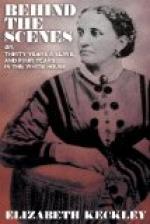Things continued in this way until about June, 1862. The Union troops had taken Fort Pillow. We had heard the firing of cannon, and did not know what it meant. One morning I was in the city after the mail, and I learned that a transient boat had just come down the river, which had lost a part of her wheelhouse. She was fired on from Fort Pillow, sustaining this serious damage from the shot. This increased the excitement among the people; and our folks became alarmed right away, and commenced talking of moving and running the servants away from the Yankees, to a place of safety. McGee was trying for some time to get some one to take the house, that is, to live in and care for it until after the war, while the family were gone. They never thought that slavery would be abolished, and so hoped to come back again. After some search, they found a widow, a Mrs. Hancock. She was to have full charge of the house and continue keeping boarders, as she had been doing in Memphis. The vaunted courage of this man seems to have early disappeared, and his thought was chiefly devoted to getting his family and his slaves into some obscure place, as far away as possible from the Yankees, that were to be so easily whipped. We were about two weeks getting ready to leave, stowing away some of the things they did not want to move. The Boss and his family, my wife and I, and all the house servants were to go to Panola, to his father’s. The family went by rail, but I had to drive through in a wagon.
* * * * *
I am taken to Bolivar farm.
Soon after the family all reached Master Jack’s, Boss took me to his own farm in Bolivar county. This separated me for a time from my wife, for she remained with the family. I had to look after the house, at the farm, attend the dining room, and, between meals, sew every day, making clothes for the hands. I could run on the machine eighteen to twenty pairs of pants a day, but two women made the button holes and did the basting for me, getting the goods all ready for the machine.
* * * * *
Capture of A Union trading boat.
The Yankees had made a raid through Bolivar, before I came, and the excitement had not abated, as they were spreading themselves all through the state. There was a Union trading boat, the Lake City, that had been successful in exchanging her goods for cotton that came from Memphis. She usually stopped at Helena, Fryer’s Point and other small towns; but on a trip at this time she came about fifty miles farther down the river, to Carson’s Landing, right at Boss’ farm. She was loaded with all kinds of merchandise—sugar, tobacco, liquor, etc. She had a crew of about forty men, but they were not well prepared for a vigorous defense. The rebel soldiers stationed in the vicinity saw her as she dropped her anchor near the




